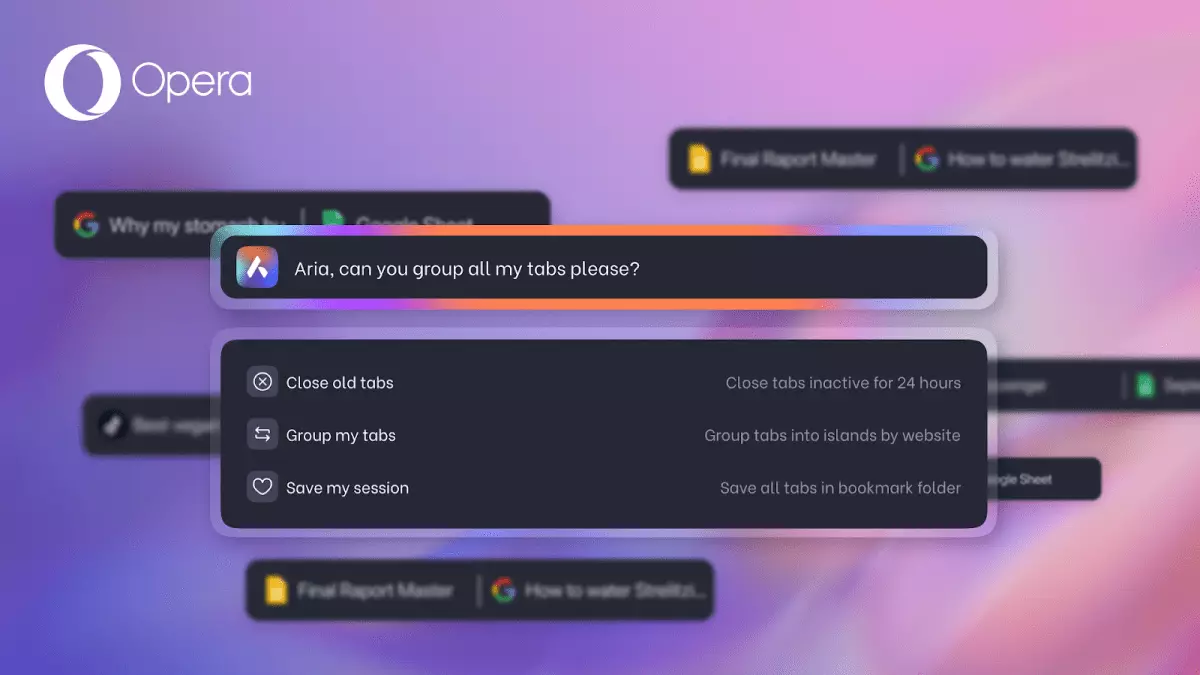In the fast-paced digital age, users often find themselves dealing with an overwhelming number of browser tabs, each representing a slice of their online life—be it work, entertainment, or personal interests. Managing these tabs has historically been a cumbersome task, with users frequently bouncing between them in search of the information they need. Recognizing this challenge, Opera has stepped up to the plate with a groundbreaking AI-feature that transforms the way we interact with our browser tabs. By facilitating natural language commands, Opera’s innovative solution aims to streamline tab management like never before.
Opera’s latest enhancement allows users to manage their tabs through simple, natural language requests. This feature leverages what the company calls the Aria command bar, which can be easily accessed by keyboard shortcuts (Ctrl + / or Cmd + /) to issue commands such as “Group all video tabs” or “Bookmark all currently open tabs.” This level of interactivity signifies a shift from traditional browsing methods to a more user-centric approach. Users can interact with their browser intuitively rather than navigating clunky menus or relying on multiple clicks.
The strength of this feature lies in its ability to recognize and execute specific user commands with ease. Those who have experienced the chaos of a cluttered browser can appreciate how being able to say “Close my YouTube tabs” or “Group all my shopping tabs” can dramatically declutter their online workspace.
Importantly, Opera has designed this feature with user privacy in mind. All processing is performed on the client side, ensuring that sensitive user data remains on the device. This commitment to privacy is crucial in a climate where data security is paramount. As users adopt this AI-driven functionality to manage their digital tools, they can do so with the peace of mind that their commands are not being sent out into the ether.
This AI feature is not merely a superficial enhancement; it represents a significant step forward in how browsers can improve user experience. While Opera’s prior introduction of Tab Islands aimed to automate tab grouping based on context, this new command feature takes user empowerment a step further. Users now have full control over their tab organization without relying exclusively on AI predictions that may not align with their specific needs.
The rollout of this feature introduces a new paradigm for both developers and users alike, encouraging a more engaged and efficient browsing experience. As Opera integrates such innovations, it sets a precedent for a shift in browser design philosophy, blending utility with user-centric features.
This AI-driven tab management feature is currently available in Opera’s developer version, with expectations for broader release on the horizon. The use of AI to simplify complex functions within the browser hints at a future where our digital tools become increasingly intuitive and accessible. As browsers evolve to meet the demands of their users, the adoption of natural language processing may pave the way for even more features aimed at enhancing productivity. In the competitive landscape of web browsers, Opera’s innovative strides position it as a key player, eager to redefine how users interact with the digital world.

